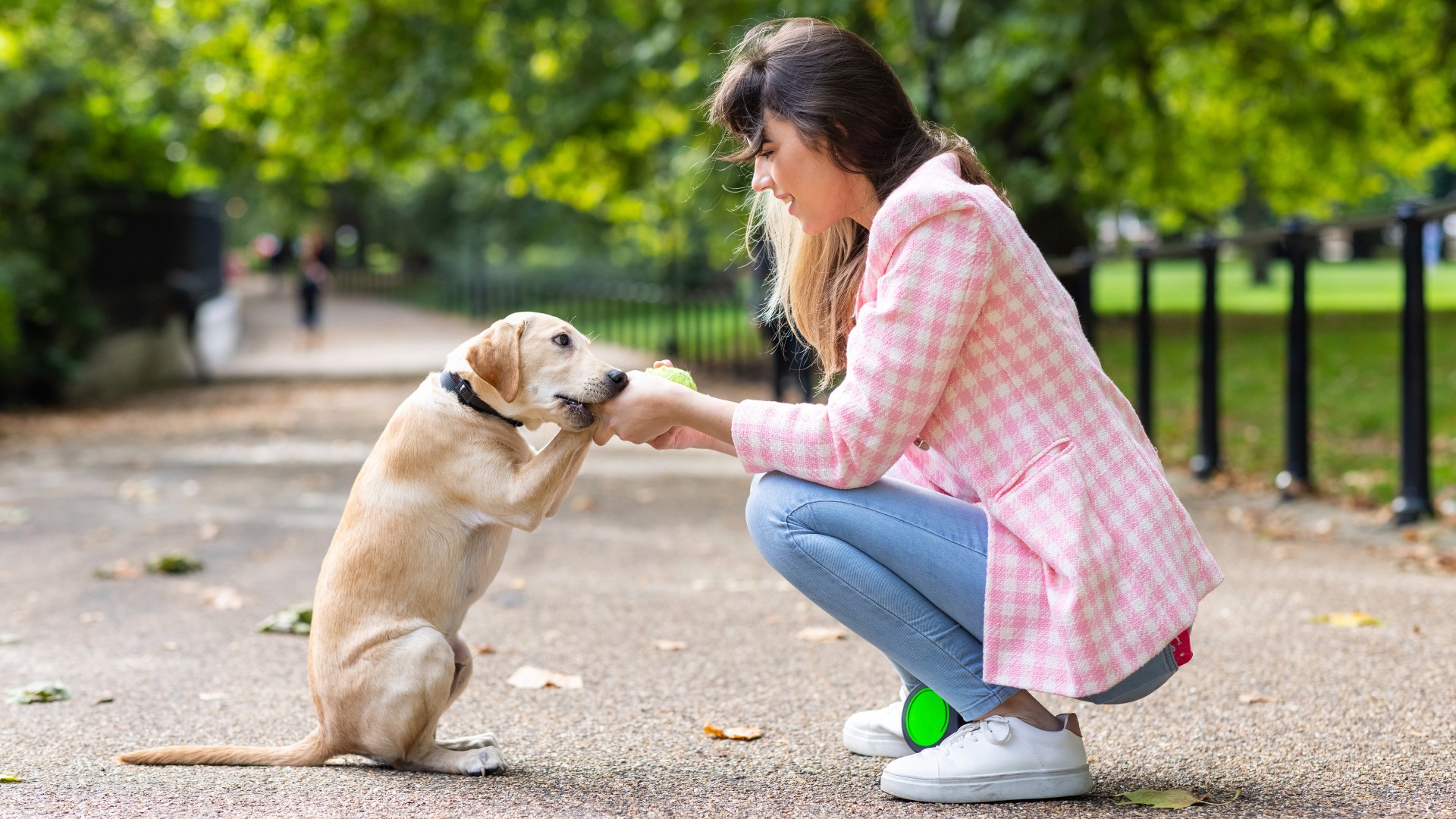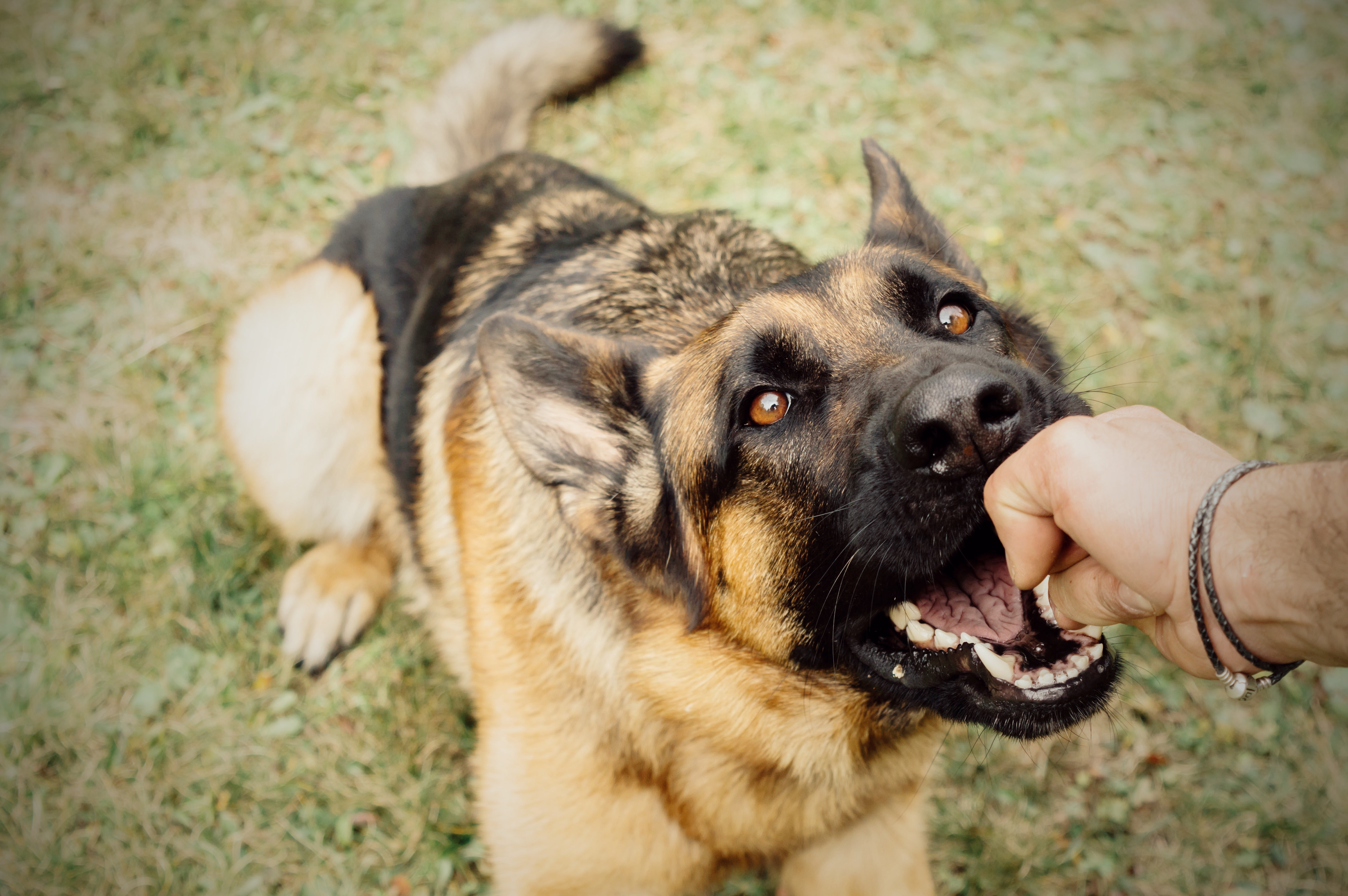Why is my dog biting and how do I stop it?
Is your dog biting? From play to fear, here are some of the most common reasons for this behavior and how you can nip it in the bud

Is dog biting becoming an issue in your home? Are you tired of playing with your precious pooch and having to fend them off when they decide to use your limbs as their own personal chew toy? Or perhaps your pup is biting strangers on the street instead? If your answer to any of these questions is a resounding yes, rest assured, you’re in the right place!
While a lot of people equate dog biting with dog aggression, there are a range of reasons why your pup may be biting. If this behavior is directed solely at you or other members of the family and is done in a gentle way, it’s most likely your pup’s way of excitedly communicating that they’re wanting to play.
For biting that’s directed at other people or occurs outside the home, there are many common causes, including your dog feeling fearful, being startled, or protecting/guarding you or resources that they believe to be theirs. Understanding the driver behind the biting behavior can help you figure out how best to stop it.
The easiest way to ensure this behavior doesn’t occur is to train a puppy not to bite from the outset. Here’s how to stop a puppy biting. But if your dog is already well past that stage, don’t worry, you can still teach them to stop biting even if they’re well into their adult years.
Below, we talk you through the most common reasons why your dog might be biting and provide you with some simple steps that you can take to ensure that you can quickly and easily put a stop to this behavior.
Reasons for dog biting behavior
Any kind of biting or mouthing behavior in an adult dog is likely a result of that dog not being taught as a puppy that if they wanted to chew or bite they needed to direct that towards a toy and not people, clothing or furniture.
Often pet parents will let their puppy mouth them when they’re young because let’s face it, at that age it's kind of cute and their teeth aren’t all that sharp so the ability to inflict damage is fairly minimal.
The issue with allowing this behavior when dogs are young is that they grow up to learn that biting is an acceptable way of either getting what they want or responding to something they don’t want.
Before you can teach your dog to stop biting, it’s important to ascertain the reasons they’re engaging in this behavior in the first place. Here’s the most common drivers of dog biting:
1. Play
This is one of the most common reasons your dog will bite and because your dog will engage in this behavior at play time with their toys and their fellow doggy friends, they figure it’s only normal that they’d do that with you too – after all, you’re one of their pack!
Light biting or mouthing is very normal during play sessions and you’ll know that it’s meant as play as opposed to aggression by the way your dog looks. If their body and face is relaxed, you can rest assured that they’re simply excited and looking for you to join them in having fun.
2. Startled
If your pup is curled up in their dog bed fast asleep and they’re woken up by you or another member of the family, that moment of disorientation may cause them to bite. You’ll find this to be more common in older dogs who may be hard of sight or hearing and who are more easily confused if someone wakes them up as opposed to when they’re allowed to awaken naturally.
3. Pain
Even the most kind-hearted dog may suddenly bite when they get sick or injured. This is because being in pain can be an overwhelming and stressful experience for dogs and can cause them to behave in ways they wouldn’t normally.
If you touch them somewhere that hurts, biting is their way of letting you know that they’re experiencing a lot of pain in that area. We recommend that if your dog is injured or sick and their behavior changes that you immediately take them to the vet.
4. Protecting or guarding
Another common reason for biting is that your dog is trying to protect you or your property from someone that they perceive to be a threat. You’ll find guardian breeds, like the Cane Corso, are wired to defend those they love but any breed has the potential to bite if they feel their home or family is in danger.
Resource guarding is also a trigger for biting and this tends to occur around treasured items, such as a favorite toy or blanket, or at mealtimes where food aggression can come into play.
5. Fear
While we often think of a fearful dog being one who has been mistreated or abandoned, dogs can feel fear even when they’re living in loving homes. Although a dog who has been dumped can definitely bite out of fear if they’re approached, so too can a usually placid dog who has been spooked by a loud noise.
How to stop your dog biting

One of the most important jobs you have as a dog owner is teaching your dog not to bite and while this is easiest to do when they’re a puppy, with patience, time and perseverance, you can definitely train your adult dog to stop biting. Here are a few of our favorite tips and tricks:
1. Bite inhibition
When you teach your dog bite inhibition, you’re basically teaching them to control the force of their mouthing. This helps your dog learn that human skin is sensitive and that if they’re going to mouth, they need to be gentle.
The best way to teach bite inhibition is to do so during play. Start playing with your dog and let them mouth you as they usually would. When he begins to bite more firmly, let out a high pitched yelp and allow your hand to go limp. This will signal to your dog that he’s hurt you.
Praise your dog for stopping their biting behavior and then resume play. This will teach your dog that when they bite, playtime is over and when they don’t do this, playtime resumes.
If your dog doesn’t respond effectively to the yelping, you can use the time-out method instead. Follow the same steps above but if he tries to mouth you again before you’ve praised him, get up and walk away for 10 to 20 seconds. You can then return and resume play.
2. Socialize your dog
Some dogs are more easily startled or scared around strangers than others, so spend time getting your dog used to all kinds of people, including children and older adults. Make sure this is done in a quiet and calm environment and don’t force your dog to do anything they don’t want to do.
3. Exposure work
Alongside exposing your dog to new people, you also want to get them used to all sorts of different noises and environments. Take them for walks where they’re likely to encounter traffic, cyclists, lawn mowers or any other loud noises that they may not be used to. This will help them to desensitize and become less afraid.
4. Have plenty of toys on hand
The best dog toys can be a real lifesaver when it comes to biting as they’re a great way to redirect your dog’s mouth towards something that’s been designed to be chewed on. Having plenty of interesting toys on hand and offering your dog one when they try to bite you will help to teach them appropriate mouthing behavior.
5. Encourage non-contact forms of play
Instead of wrestling or rough play with your hands, try to play games with your dog that don’t involve a lot of contact. Examples of this are things like fetch and tug-of-war, where your dog’s focus is on an object as opposed to you. To learn more, have a read of our feature on dog play biting.
6. Teach impulse control
One of the best ways of discouraging biting is to ensure you’ve trained your dog in various commands that get them to stop what they’re doing and give you their full attention. Words like ‘sit’, ‘wait’, and ‘leave it’, are all really strong commands that will get your dog to stop their biting behavior and wait for further instructions from you.
7. Use positive reinforcement
Just like us humans, dogs respond best to positive reinforcement, so try to avoid harsh language or forms of punishment if your dog bites. Instead, every time your dog behaves in a desirable way, reward them with lots of praise and a few of the best dog treats.
8. Use a bitter spray
Another method to stop your dog biting is to spritz your arms, hands, legs, feet and clothing with a bitter spray. Every time your dog mouths you, they’ll get a bitter taste in their mouth and after a couple of weeks of this, their mouthy behavior will likely stop.
9. Keep your dog on a leash
When you’re out on your daily walks, we recommend that you always keep your dog on a leash. This will ensure that they can’t run up to other dogs or people – you can also use a muzzle if they’re particularly skittish or fearful when out and about. It’s also wise to ensure that when you let them outside at home, that they remain inside a fenced area.
Here are our top tips on how to discipline a puppy. Is your dog play barking? A behaviorist reveals why in this feature.
PetsRadar Newsletter
Get the best advice, tips and top tech for your beloved Pets

Kathryn is a freelance writer who has been a member of the PetsRadar family since it launched in 2020. Highly experienced in her field, she's driven by a desire to provide pet parents with accurate, timely, and informative content that enables them to provide their fur friends with everything they need to thrive. Kathryn works closely with vets and trainers to ensure all articles offer the most up-to-date information across a range of pet-related fields, from insights into health and behavior issues to tips on products and training. When she’s not busy crafting the perfect sentence for her features, buying guides and news pieces, she can be found hanging out with her family (which includes one super sassy cat), drinking copious amounts of Jasmine tea and reading all the books.
